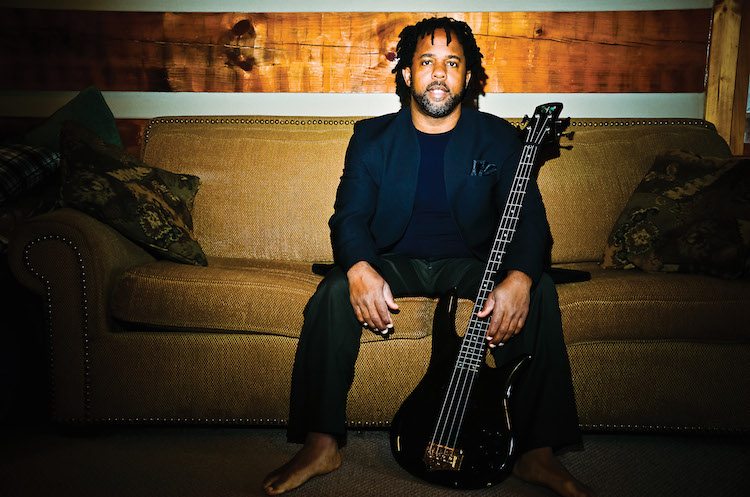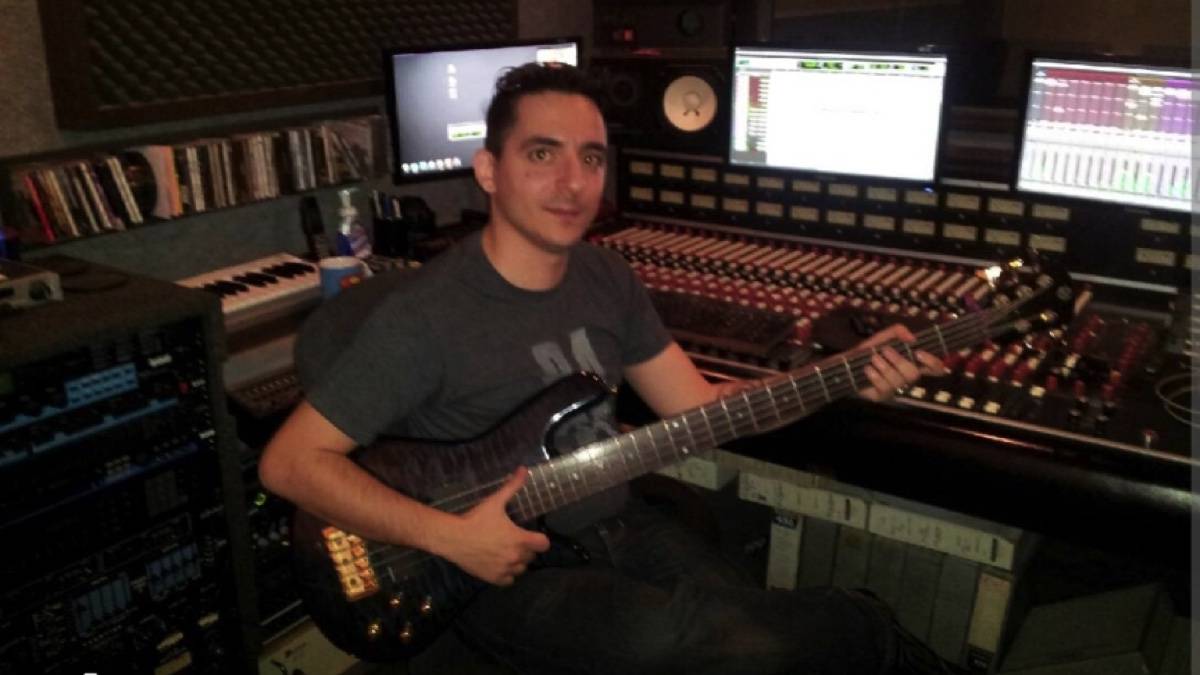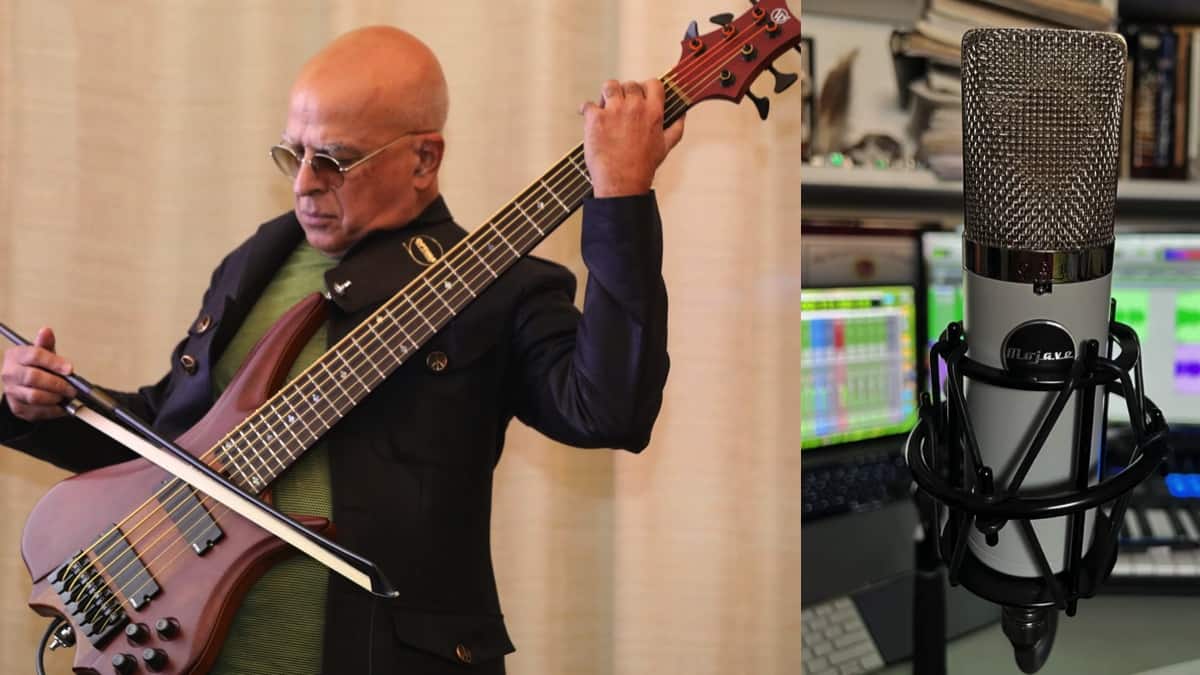Bass Player News
A Report on a Victor Wooten Workshop in Budapest


Photo by Steve Parker
Alert! The following is a long post, as it tries to summarize the 70+ minute Victor Wooten Workshop held in in Budapest.
Well, the last clinic I attended was Jeff Berlin’s (read the report here) and now I had the luck to experience another point of view and attend Victor Wooten’s workshop here in Budapest right before his concert. Shortly, I can only say it was just great to enjoy the presence of Victor Wooten – I am definitely a YouTube guy and I have watched a lot of clinics online and learned a lot from them but a ‘real’ live experience can be so much more – just like improvisation, some things turn out in a way that you did not expect – for example Victor really told me to “have some kids” when answering my question. So I definitely recommend you to visit these clinics and workshops in the real world 😉
I am glad I had the opportunity to see Victor talk and play and I am very happy that he has given us many point to think about. Just to relate it to Jeff Berlin’s clinic, the most important thing that came to my mind after the workshop is that these “schools” or methods of masters are not really that rigid as people may think – if you are open enough you can use utilize them in a flexible way and use certain elements of a “school” in a given period of your learning path. At the beginning of your bass playing career, you might prefer Victor’s freedom, later, you might use Berlin’s focus and progress that way – or it might be the other way, or if you can take it, use certain “exercises” or methods simultaneously. I agree that there are general ways to get better which work best for the majority but we are different personalities – I can also imagine that there are really thousands of personal unique paths. Educators share methods that they have seen work the best in their lives, and in their student’s lives.
As for me personally, I have walked Victor’s path for many years, but sometimes, I need to use Jeff’s focus and put together my theoretical knowledge and go back to basic theory and clean up my knowledge and learn to play again. But I know that while doing that I often get stiff, I often get “stale” because I want to play good according to theory (I am worried that my grammar is not good, so I fail to convey the idea) – so then, I have to go back to some of Victor’s advice and just really “talk”, or concentrate on the music and do not care if the notes are not always “correct” according to theory/grammar.
So I guess the advice is to be open, try many schools, try many methods and take what is working for you.
It was a really informative and involving workshop and it seems that it is pretty hard to highlight certain “points” since everything was really connected with each other and it made sense as a whole. Anyway, I tried to connect the dots and re-tell the story of Vic through my lenses – and here you are:
1. Language and music – and the best way to learn.
As a basic foundation, Victor’s philosophy about learning music as a language came up – he said that one can learn to talk best if the talks to other people. So personally, he thinks that the best is to get together with people who are better than you, and play music with them. He argues that babies are not sent to learn to talk with other babies to baby-schools, they immediately begin to learn with professionals – their parents. Adults and babies learn together to communicate and adults are often amused by the babies’ mistakes and then they adapt those mistakes and use them in their language.
Of course, this is one aspect, I guess Vic learned this way, but also, Vic does not say that apart from this, there is nothing else to do: everything should be done (scales, reading, theory, etc.) but still, according to him, the best way to learn is to be in band where the members are better than you – and he also added that you also should be in bands where it is you, who is better than the others. I hope everyone one of you has the time for that 😉 And if there is no band? Well, children talk to themselves – they imagine their friends and they have a conversation. Just leave the space for the persons with whom you are talking/playing – for the drummer, the guitarist and the keyboard player.
This might sound too crazy for some of you, but the demonstration was pretty convincing – a guy had to come to the stage and play something which was not really solid. Then Vic made him imagine the whole band – “close your eyes and just hear the drummer. And after you have listened to a few bars, join the drummer.” Actually, you should have heard it 😉 The guy just became rock solid. He did not improve his technique or his notes, he only became focused by not paying attention to himself. It seems, putting the focus off of you and your instrument is a pretty musical tool.
2. Females, bass and a dancing C
Vic added that usually female bass player get this pretty soon – they realize they cannot join and win the “muscle competition” of the guys, so they decide to play music and support the band. And after just a few years of playing, they are in several bands. Connected to this, Vic also mentioned that we as part of the rhythm-section should play rhythm. We are the bridge between harmony and rhythm but we are not called the note-section – nobody dances to a C. Well that corresponds with the first of the ten commandments of bass 😉 So guys, heads up, play the necessary notes and get many jobs 😉
3. Practicing and finding your own voice
So basically the best practice is to be in a (imaginary) band. Okay. Cool. But the eager everyday bassist wants to know some other details as well: “How many hours/how do you practice?” and “How do you find your voice/sound?” Vic asked back “You speak so well Hungarian, how do you do that? How many hours do you practice?” Well, we just talk. We use it all day, always. There is no set 45 minutes or 6 hours a day. Also, we do not think about our voices (hmm, should it be a bit lower?) we just end up being ourselves by the many impressions we get throughout our lives. The important bit should be to think about what we have to say.
He said that during a tour where he does a soundcheck, a workshop and a concert – that is surely enough for the day – Vic noted that if he would sit in his room practicing, he would not gain the unique impression of the place where he plays and he would become sort of empty. By the time of the concert he would have anything to “talk” about. In that way, he said the concert would be lifeless and stale.
Vic actually confessed that he does not really like to practice – he likes to play. Still, he gave some insight on his how-to as well: first he listens to it as much that he can sing it and after that he learns parts of it on the instrument. Then he puts the music on computer and plays it with the file and later on, he begins to perform – he stands up, imagines the orchestra, imagines the audience and after that he sometimes invites friends as well, so that way when he plays it with the orchestra, it will not be “the first time” he played it.
According to Vic, practising in our mind is much more beneficial – if you use the “brain-hand” direction, your hand will know what to do and you just have to use it in music. If you just sit and practice it with the hands many times so your brain can learn it, it will take you longer time to master it. If you know how to do it, go and do it. If you know theoretically how to swim, it is no point in practicing outside of the water. He cited Classical Thump as an example – he made up this song to practice his double-thumb technique and its alternate versions as a piece of music.
4. Look for information and information everywhere!
So instead of putting your focus in one direction, you can also learn music without your instrument – you just have to be open and look for information on all places. Vic believes that Life wants to give us answers but if we are looking for answers, we are usually focused in one way and we want to have the answer in a certain shape and form but it might not come that way – so open up! J
A nice example he noted about looking for answers on all places was about perfect pitch – who does not want to have it? Well, okay. Do you train you ear only when you are practicing your instrument? Does your car have a beep when it notifies you to wear the seatbelt? Vic’s car beeps on a G note. And on what note does your cell phone ring? And we’re back to our mind-practice again.
5. How to learn not to care? Have some kids!
Okay, so I admit this is an eye-catching headline. Sorry about that, but this was actually making sense for me when Vic told me J I had one question to Vic – while answering another question Vic stated that over the years he learned not to care. And I had to ask how to learn that. J
Vic said “this has nothing to do with music – it is your life. It is like you care so much that you do not care”. He asked me whether I have kids and as I said not yet, so he replied by saying me “Have some kids” And then he explained – you can see all their mistakes, but you love them anyway. They knock over your favorite bass but that is okay … “your love is bigger than caring about that one little mistake. And why should a mistake on a concert ruin my whole night? Do i really care about what you think? Do I give you really that much power over me? So I’ll just say – look, I am just gonna give you me, if you don’t like it, it is your choice. What you think is out of my hands. I’ll still make the record that makes me happy. If 2 people buy my record , they love me because who I really am not who someone is trying to be fake so you can be happy.
“A mistake is something I did not mean to do. I am not trying to play perfect. Life is fun because you don’t know – you make mistakes but keep going anyway. You can’t score all the time, you have to miss a bunch. It is like football players – that’s why they celebrate when they score – because their miss most of the time. They try their best, and we understand how hard the struggle is. If everything would goes as planned you are bored. If you scored every time it would become boring.” Vic added that sometimes mistakes sound as mistakes, but it is the unexpected – so then again, as he listens to them a bit later sometimes they sound different – and then there are times when he learns those mistakes because they were unique and unexpected.
He once again noted that bringing the focus off of you is a great help – “when the singer starts singing – nobody is listening to you, play the bass part, make them sound good – make her happy that she hired me”. When you take a solo, make your solo about the song, not you. Play for the music, not for you. Make the song greater.
6. Music?
I guess this is a usual part of Vic’s workshops – he asked us to tell us a word that comes to our mind about music. People said a lot of things: fun, spirit, sacred, life, freedom, chance, expression, color. Vic pointed out that no one ever said techniques, double-thumping, theory, fear, practice or even bass. He told us to remember that “these are only tools, not music – tools are there to get you where the music is. And that’s your goal! Remember it.”
Cheers,
Rajoe
Bass Player News
Bassist/Music Educator Andreas Farmakalidis Candidate for LAUSD District 3

Bassist/Music Educator Andreas Farmakalidis Candidate for LAUSD District 3: A Champion for Music and Arts in Schools…
Andreas Farmakalidis, a renowned music educator and business owner, will be on the ballot for LAUSD District 3 School Board. As an independent candidate, Farmakalidis brings a fresh perspective and a passionate commitment to revitalizing music and arts programs in schools. With a proven track record of success and a vision for a brighter educational future, Farmakalidis aims to provide every child with a well-rounded education. Andreas Farmakalidis is not just an exceptional educator and business owner; he is also an accomplished movie composer, having contributed music to several renowned films.
His talent and dedication earned him a prestigious Spotify and Hollywood Music Award. Beyond music, Farmakalidis enjoys cooking, specializing in Greek and Cypriot cuisine. He is happily married to Alexis Lopez, a former American Idol finalist, and together they embrace the joy of parenting their two-year-old daughter, Mavis. Known for his unwavering hard work, dedication, and passion, Farmakalidis has always championed causes that are close to his heart, especially education.
With a diverse and vibrant community in LAUSD District 3, Farmakalidis recognizes the unique challenges and opportunities that lie ahead. His commitment to this district is rooted in the belief that every child, regardless of their background or circumstances, deserves a high-quality education that equips them with the skills and knowledge they need to succeed in life.
“I have witnessed firsthand the transformative power of education in the lives of young people and the broader community,” says Farmakalidis. “It is our responsibility to invest in our schools, teachers, and students. By ensuring safe and welcoming learning environments and providing necessary resources and support to our educators, we can achieve equity and inclusivity in our educational system.
Every child should have a fair shot at achieving their dreams.” Furthermore, Farmakalidis is dedicated to fostering strong partnerships between schools, parents, businesses, and the broader community. Recognizing that collaboration and engagement are essential to address the unique needs of the district, he aims to create opportunities for learning, growth, and success for all. In addition to his commitment to academic excellence, Farmakalidis firmly believes in the importance of the arts in education.
He envisions a District 3 where every child has access to a comprehensive arts education, regardless of their background or neighborhood. By investing in music, visual arts, theater, and dance programs, and providing students with the necessary tools and resources, Farmakalidis aims to inspire creativity, foster innovation, and provide a powerful means of self-expression. The arts play a crucial role in developing critical thinking skills, enhancing cultural awareness, and building empathy by exploring diverse perspectives. “I am running for LAUSD District 3 because I believe that, with the right leadership, we can make our schools even better, provide our children with a brighter future, and strengthen our community as a whole,” says Farmakalidis.
“Together, we can work towards a brighter, more equitable future for all our students.” In the upcoming election, LAUSD District 3 voters have a choice to make. Farmakalidis stands out as the only candidate who prioritizes bringing music and arts back to schools, recognizing the profound impact they have on students’ development and growth. The stakes are high in this election. The right candidate can shape the future of education in LAUSD District 3, ensuring that every child has access to a high-quality education and the opportunity to thrive. Andreas Farmakalidis’s proven dedication, commitment, and passion make him the ideal candidate to lead the way.
For more information on Andreas Farmakalidis and his campaign, please visit www.lausd3.com
Follow him on social media @afarmakalidis.
Bass Player News
Freekbass Crowned TikTok LIVE Fest Finalist

Hometown bassist and frontman, Freekbass is representing Cincinnati as a Top 30 Award Winner for TikTok LIVE Fest, with a ceremony set to take place in January 2024, in Los Angeles, CA.
TikTok LIVE Fest is a global event across 50+ countries and regions that recognizes and celebrates top creators. The contest took place from December 1st-16th, with each talent accruing points based on support from their communities during their live streams. What began as thousands of streamers competing worldwide, was reduced to a cut of 300, then 150, and ultimately the final Top 30 were crowned as the winners. Freekbass, who just started streaming on TikTok in March of this year, placed as Top 24 creator, globally. To give context, social media influencer and TikTok veteran, Jeffree Star, placed third in the same competition. All Top 30 winners receive airfare, hotel and travel expenses to appear at the TikTok LIVE Fest Awards Ceremony, along with other prizes.
Freekbass performs a one-man show, creating live music with his signature bass-playing, and also plays guitar, percussion, keys and vocoder, using DJ beats and samples, while staying continually engaged with the viewers via chat. He accredits his rapid rise in popularity to his loyal community, lovingly dubbed the “Freek Squad”. To meet them virtually and check out a nightly Freekbass live stream, visit TikTok.com/@freekbass most evening, starting at 10pm ET.
Bass Player News
Immortal Sÿnn Welcomes Former Grim Reaper Bassist Chaz Grimaldi

Immortal Sÿnn Welcomes Former Grim Reaper Bassist Chaz Grimaldi…
Denver-based heavy metal group, Immortal Sÿnn, proudly announces the inclusion of Chaz Grimaldi, former bass player of Steve Grimmett’s Grim Reaper, as the latest addition to their dynamic lineup. This development follows Sean Ryan’s departure from the band four months ago. With Chaz on board, Immortal Sÿnn is forging ahead, actively resuming live performances in the Denver area and strategically planning a forthcoming United States tour for the summer of 2024.
Chaz Grimaldi, an accomplished bassist originally from Silver Spring, MD, brings an impressive musical history to the fold. With a prolific career that notably includes his role in the 80s NWOBHM legends Grim Reaper, renowned for their iconic “See You In Hell” (2008-2016 & 2019), and Dave Lombardo’s Grip Inc. (1993), Chaz’s journey has been one of remarkable experiences. Reflecting on his global tours with distinguished musicians, he shares, “Having been fortunate to tour the world playing with some of the best musicians has been an incredible blessing in my life. The lifelong friendships of people I’ve met and the incredible places I’ve seen has been truly amazing.” Chaz’s recent endeavors with Tampa-based band Jezabelle garnered significant online attention. Now, as he joins forces with Denver’s Immortal Sÿnn, he eagerly anticipates contributing his prowess to the collective.
Chaz states, “I’m excited about the opportunity to play with Immortal Synn! The song catalog kicks ass and has all of the elements of METAL that I love to play. I look forward to being a part of this incredible band!”
Immortal Sÿnn recently unleashed their latest single, “Lady Nocturna,” on August 4th. Currently collaborating once again with engineer Nick Nodurft at Rusty Sun Audio in Parker, CO, the band is immersed in recording a 5-song EP titled “Hellspawn.” The EP is set to release on September 15th across major streaming platforms and digital stores, with physical CDs to follow.
Reflecting on the addition of Chaz Grimaldi, Tony Z, guitarist of Immortal Sÿnn, affirms, “We all knew Chaz was our guy when he came to the audition and actually knew all of the material and was well-prepared. He didn’t just ‘look at’ the songs we had sent him and fake his way through them like so many people in the local scene do when it comes to auditions.”
For fervent fans of bands such as Grim Reaper, Judas Priest, Iron Maiden, and Megadeth, Immortal Sÿnn’s signature blend of heavy metal elements continues to resonate and excite.
Visit online at immortalsynn.com
Bass Player News
Listen to the First New Recording from The Fusion Syndicate in Over 10 Years!

In 2012, the world of fusion rock/jazz was shook by the introduction of a new supergroup of unparalleled musical virtuosos who came together under one umbrella for a blockbuster studio album.
Both the group and its debut album were called simply The Fusion Syndicate, and it featured some of the biggest names in fusion including members of Mahavishnu Orchestra, Yellowjackets, Brand X, Soft Machine, and Spyro Gyra PLUS Yes, Dream Theater, King Crimson, Tool, Porcupine Tree, Hawkwind and more! Now a new single is released today with the first new recording from The Fusion Syndicate in over 10 years!
That new single, “The Bottle,” is unique in several ways. For starters, it is the Fusion Syndicate’s first ever cover song, a trippy, groovy version of jazz poet Gil Scott-Heron’s 1973 dramatic story of alcohol abuse in the inner city. Second, the track is the first to incorporate R&B and soul music flavors into the band’s repertoire driven by a stellar vocal from intergalactic superstar Bootsy Collins. In addition, joining Collins is multi-instrumentalist Brian Jackson, who was a member of Gil Scott-Heron’s band and performed on the original recording of “The Bottle.” Here, Jackson recreates the vibe 1970s soul jazz while bringing a modern flair that perfectly suits The Fusion Syndicate’s style.
Could this be the first song from a forthcoming full-length album from The Fusion Syndicate? Stay tuned in to The Fusion Syndicate revolution to learn more!
Bass Player News
Eduardo Del Signore Calls Attention to Climate and Social Change

Eduardo Del Signore’s A Call 2Peace Foundation Calls Attention to Climate and Social Change, Using Tools from Mojave Audio…
A Grammy-nominated artist with a career spanning over 50 years and numerous collaborations with artists such as Jon Anderson of Yes and Brazilian legend Milton Nascimiento, Eduardo Del Signore has found new inspiration by combining his love of music to support climate and social change. Recently, Signore created a platform for artistic expression called A Call 2Peace foundation, designed to bring awareness to other organizations and the work they’re doing through concerts, events and fundraisers.
“A Call 2Peace is a reminder that we all possess peace in our hearts, and that it’s our responsibility to visit this each day and enjoy it, embrace it and live by it,” Signore says. At the start of the pandemic, the foundation began a food recovery initiative that collected ½ million pounds of food from supermarkets, which were taken to distribution centers. The foundation also puts on the Tuesday Night Jazz concert Series in Santa Monica where Signore uses the MA-D. “I use the MA-D for all live performances, I compared it against the standard and now I can’t go back. The Mojave is so much better,” he says.
Signore was interested in adding a Mojave MA-301fet mic into his workflow to be a dependable microphone that captures the true sound to represent his instrument. Since adding the mic to his kit, Signore has recorded an opera singer, violin, Spanish guitar, viola, cello, and more and finds the Mojave microphone to be user-friendly and an ideal solution that works perfectly for his many applications.
Music to engage climate change
Signore has an ongoing collaboration with ClimateMusic in San Francisco, an organization that synergizes the talent and expertise of work-class scientists, composers, musicians, artists and technology visionaries focused on engaging audiences on the issue of climate change. The organization commissioned a composition from Signore that focuses on three primary aspects: the effects of the industrial revolution to the present, and then projecting into the future with two different outcomes. “The first scenario looks at the future — if we carry on business as usual. The second looks at if we become active in certain areas, and how that could influence climate change,” Signore says.
As part of his audio toolkit, Signore deployed the MA-D and other mics from Mojave to record the music. “I look for the instruments and accessories that allow me to express with the utmost clarity what I have to say. Whether it is for singing, or an instrument or recording someone else. For this project, I used the MA-301 fet microphone for all vocals and acoustic instruments. This microphone is so transparent and true to the source. It is the perfect portal for any vocals or instrument that I want to record,” he says.
For more information and detailed specifications, please visit: mojaveaudio.com



















